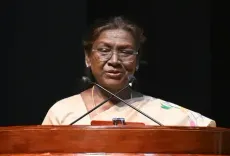How Did a Karnataka Woman Achieve Her Dreams Through Atmanirbhar Bharat Rojgar Yojana?

Synopsis
Key Takeaways
- Hard work can lead to transformation.
- Women’s empowerment is crucial for community growth.
- Government initiatives can provide necessary support.
- Business growth requires adaptation and innovation.
- Community upliftment is achieved through collaboration.
Kalaburagi (Karnataka), June 29 (NationPress) The inspiring tale of Jagdevi Chandrakant Neelagar, a resident of Kalyan in the Kalaburgi district of Karnataka, showcases the power of hard work, dedication, and self-reliance. Once struggling financially, Jagdevi transformed her life and became an inspiration for many women by evolving a small venture into a thriving business.
Her journey epitomizes women's empowerment and economic self-sufficiency facilitated by the Atmanirbhar Bharat Rojgar Yojana (ABRY).
Jagadevi initiated her venture from home, making jowar roti, a beloved dish in North Karnataka. Acknowledging its demand, she built her business around it. Initially producing a limited quantity, the exceptional quality of her rotis led to a surge in demand. Over time, she expanded her product line to include other traditional favorites like peanut chutney and peanut poli.
As her enterprise flourished, managing the growing demand became a challenge. She welcomed other women into her workforce, not only creating job opportunities but also fortifying her business. During this period, the Atmanirbhar Bharat Rojgar Yojana became a significant asset for her.
Jagadevi secured a loan of Rs 5 lakh through this initiative, which allowed her to employ more women. As the demand surged, she increased her loan to Rs 15 lakh for purchasing a millet grinding machine. Eventually, to cater to the growing demand, she acquired a roti-making machine. These strategic investments propelled her business to unprecedented levels.
In an interview with IANS, Jagadevi stated, “As our business expanded, we realized that our initial workforce was insufficient. We fully embraced the Atmanirbhar Bharat Rojgar Yojana. Our first loan was Rs 5 lakh, and as we hired more women workers due to rising demand, we increased the loan to Rs 15 lakh. This enabled us to acquire a millet grinding machine, and with the increasing popularity of our jowar and millet rotis, we also invested in a roti-making machine.”
Jagdevi’s son, Siddu, remarked, “We began with just five kilograms of jowar, and now we sell by the tonne. My mother not only repaid all the loans but also made our business entirely self-sufficient. She started cultivating jowar in our fields and employed 20-25 women, empowering them economically and enhancing their lives. My mother’s story is a beacon of women's empowerment and upliftment.”







